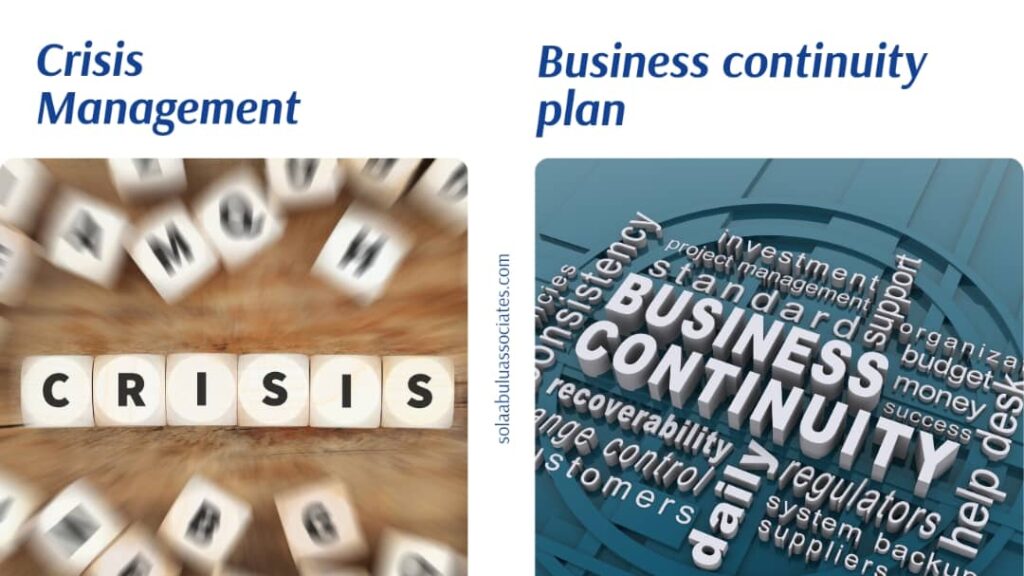What is the difference between crisis management and business continuity plan?

A crisis is a sudden and unplanned event that results in the instability of a business, brand or organization. A crisis typically challenges the entity affected in terms of its finance, and customer loyalty with a threat to the business. An example of a crisis is the outbreak of Covid-19 that broke out in 2019/2020 with a global pandemic because of how multifaceted it is with economic, health, political, safety, employment and household issues attached to it. The crisis which resulted from the lockdown in countries affected business operations because of the logistic challenges and customer traffic. Another instance of crisis can be caused by customer dissatisfaction and a quick escalation with the help of social media.
“Crisis management is a process designed to prevent or lessen the damage a crisis can inflict on an organization and its stakeholders.” ~ Sola Abulu.
You will find this article on The Role of Strategic Communications in Crisis Management very useful.
What is the focus of crisis management?
- Reputation management
- Protects the organization from developing another crisis within a crisis
- Enables the organization to do the right thing and be seen doing the right thing
Crisis management is weightier than issues management and demands more because of its potential to affect an organizations reputation, license to operate and stakeholders. This is why there must also be a strategic crisis communications plan put in place that helps the organization respond effectively. On the other hand, issues affect the people, environments and assets but when not managed properly, issues can rise to become a crisis. Another concept that is commonly interchanged with crisis management is crisis communications. This article explains further on the difference between crisis management & crisis communications
The mistake many business leaders make is to assume that crisis management focuses on just operations and business resilience, all tied to business continuity.
According to Tony Jaques in his article “Why Business Continuity is not the same as crisis management”, he states that: “Any organization which imagines that a business continuity plan makes them ‘crisis prepared’ is due for a big and costly surprise. Business continuity is just one element of strategic crisis management, and failure to recognize this, and failure to recognize this can leave you dangerously vulnerable to operational and reputational risk.”
In the business and corporate world, a business continuity plan is very robust and handy in the event of unfortunate incidents and issues.
Search Disaster Discovery defines a business continuity plan as “a document that consists of the critical information an organization needs to continue operating during an unplanned event. The BCP states the essential functions of the business, identifies which systems and processes must be sustained, and details how to maintain them. It should consider any possible business disruption. A BCP covers risks including cyberattacks, pandemics, natural disasters and human error. The array of possible risks makes it vital for an organization to have a business continuity plan to preserve its health and reputation.”
A business continuity plan is a proactive concept. It is set in place even before a crisis occurs to a brand, business, organization and entity. Its goal is to keep operations running in disrupted and uncomfortable crisis conditions that the business or organization may encounter. It is focused on ensuring that things continue to work well within a business, brand or organization during a crisis. Crisis management therefore becomes a more effective way to manage a crisis. You can learn more here.
What a business continuity plan focuses on:
- Understand potential weaknesses or crisis
- Quick reaction to business interruption
- Continuation of service delivery during a crisis
- Maintains financial viability
- Decrease business downtime
- Protects business operations and profitability.
You can read more on the definition of a business continuity plan here.
A business continuity plan is all about the business or organization. It is concerned with the service, finance, downtime, and operations. On the other hand, crisis management does not just focus on the business but on the stakeholders. Therefore, the perspective in crisis management is both internal and external while that of a business continuity plan is internal only.
…………………………….
Sola Abulu & Associates is a strategy and communications training and consulting firm focused on enabling businesses, brands and institutions to achieve their desired objectives through strategic communications and reputation management.
Chat with us for more information on our courses.
